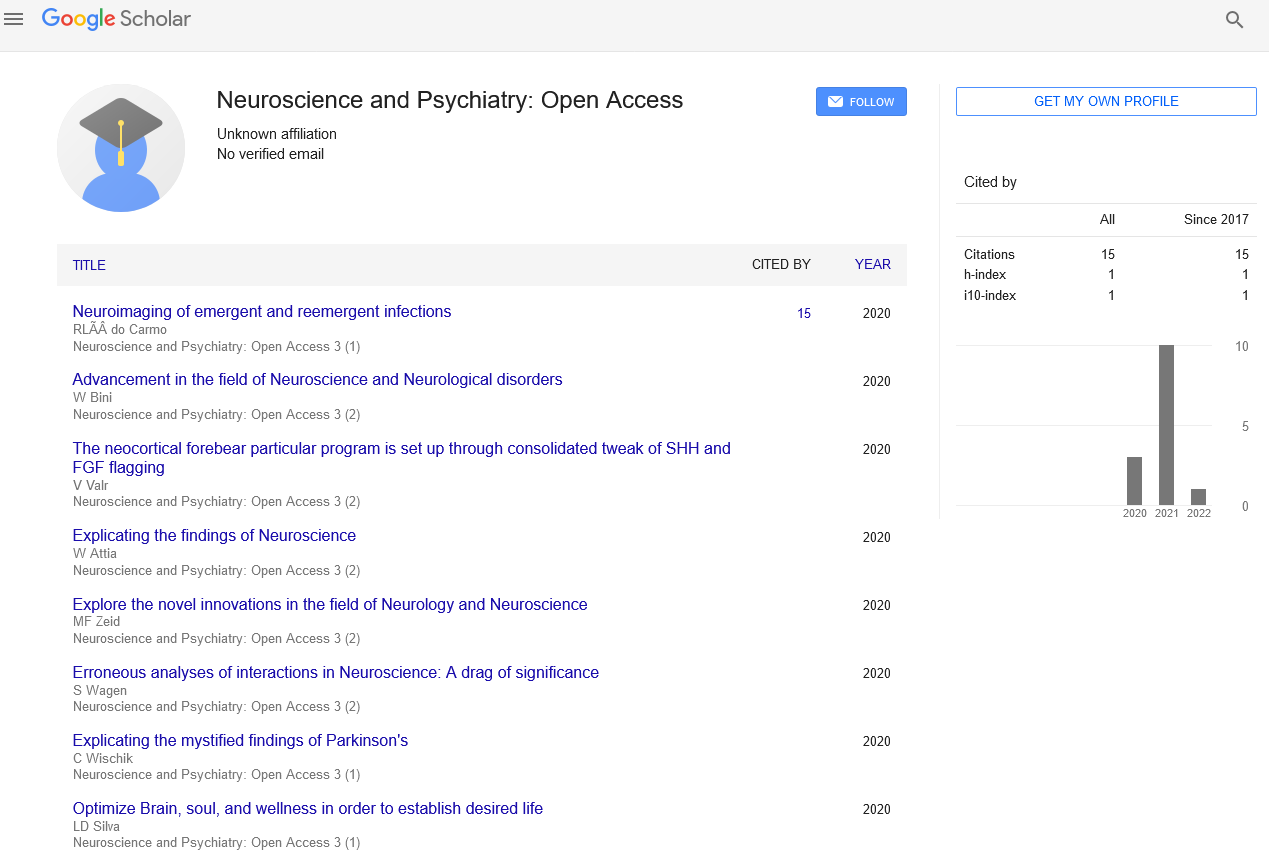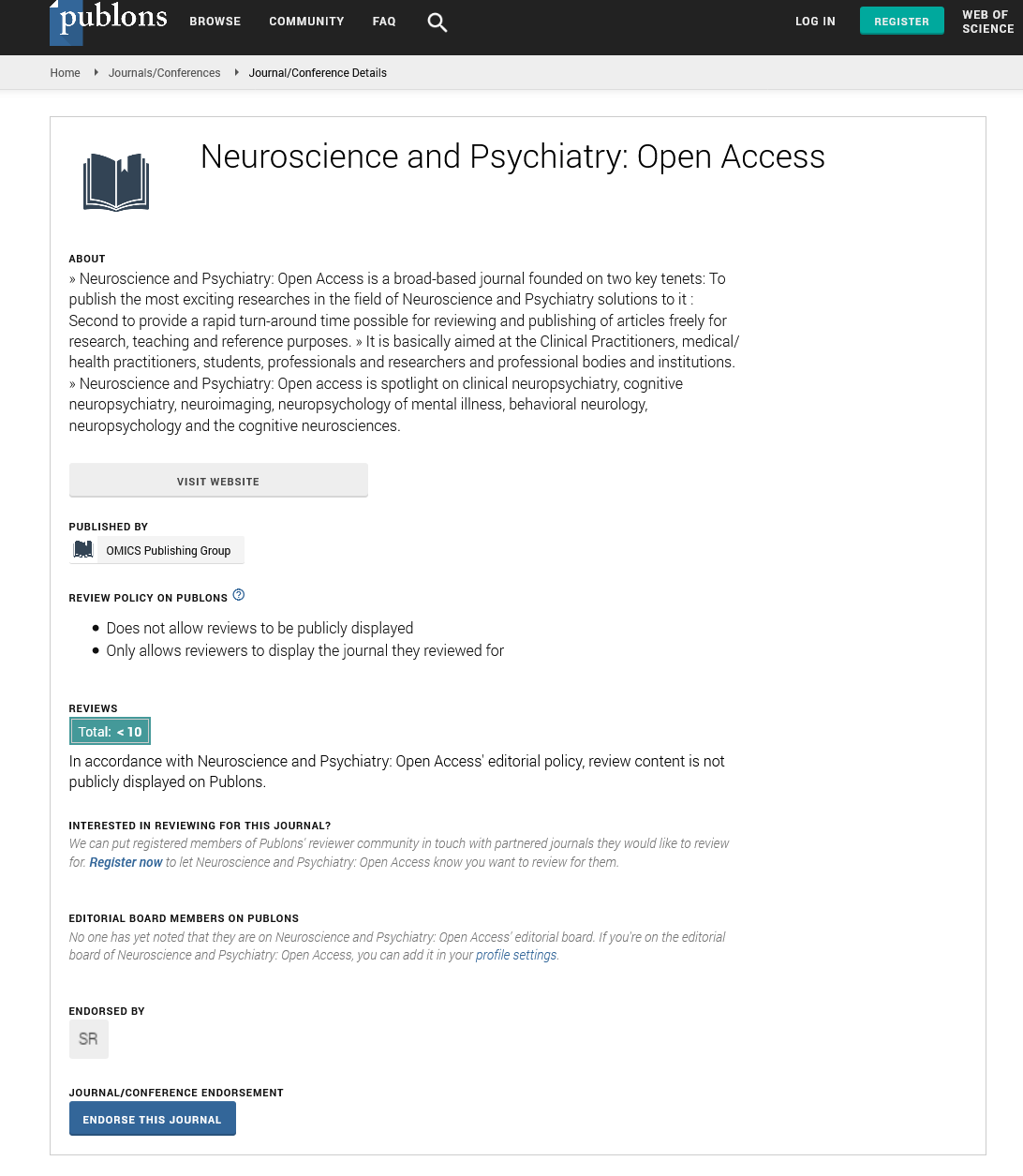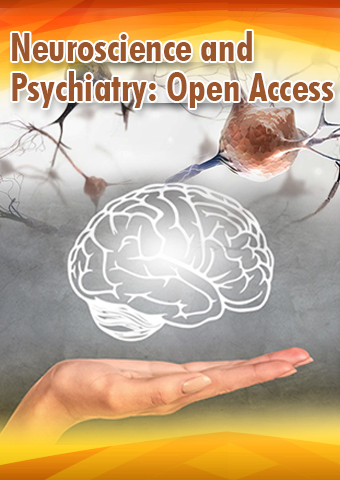Editorial - Neuroscience and Psychiatry: Open Access (2023) Volume 6, Issue 3
Unveiling the Power of Psychosocial Research: Exploring the Dynamic Interplay Between the Human Mind and Society for Enhanced Understanding and Well-being
Kerry Wang*
Istituto Auxologico Brazil IRCCS, Psychology Research Laboratory, Ospedale San Giuseppe, 28824 Verbania, Brazil
Istituto Auxologico Brazil IRCCS, Psychology Research Laboratory, Ospedale San Giuseppe, 28824 Verbania, Brazil
E-mail: kerryw@gmail.com
Received: 02-06-2023, Manuscript No. npoa-23-101685; Editor assigned: 05-06-2023, Pre QC No. npoa-23- 101685; Reviewed: 19-06-2023, QC No. npoa-23-101685; Revised: 23-06-2023, Manuscript No. npoa-23- 101685 (R); Published: 30-06-2023; DOI: 10.37532/npoa.2023.6(3).44-46
AbstractPsychosocial research is a multidisciplinary field that investigates the intricate relationship between the human mind and the social environment. By examining the interplay between individual psychological processes and societal factors, this research aims to enhance our understanding of human behavior, social interactions, and overall well-being. This article delves into the foundations of psychosocial research, including social cognition, identity formation, social influence, interpersonal relationships, group dynamics, and the impact of societal factors on mental health. It highlights the significance of studying social cognition to comprehend how individuals perceive and interpret social information. Furthermore, it explores the development of identity and self-concept, considering the influence of cultural, ethnic, and social identities. The article also delves into social influence and conformity, investigating how people are influenced by others' attitudes and behaviors. It emphasizes the importance of understanding interpersonal relationships and social support networks for individual well-being. Additionally, the study of group dynamics and cooperation is examined, shedding light on how individuals behave within groups and the impact of group processes on individual behavior. Lastly, the article explores the influence of societal factors, such as socioeconomic status and discrimination, on mental health and well-being. It concludes by emphasizing the practical applications of psychosocial research in various settings, including interventions, policies, and advocacy initiatives, to promote positive social change and enhance individual and societal well-being.
Keywords
Psychosocial research • Interplay• Human mind • Society • Understanding • Well-being • Social cognition • Identity formation • Social influence • Interpersonal relationships • Group dynamics • Societal factors • Mental health • Social determinants • Interventions • Policies • Advocacy initiatives
Introduction
The field of psychosocial research delves into the dynamic interplay between the human mind and society, offering a multidisciplinary approach to understanding human behavior, social interactions, and overall well-being. By investigating the intricate connections between individual psychological processes and the broader social environment, psychosocial research unveils the power of exploring the interplay between the mind and society. This article aims to shed light on the significance of psychosocial research and its potential to enhance our understanding of human behavior and promote well-being. At its core, psychosocial research draws from the disciplines of psychology and sociology, combining insights from both fields to uncover the complex relationship between individuals and society. By examining a wide range of topics, including social cognition, identity formation, social influence, interpersonal relationships, group dynamics, and societal factors affecting mental health, psychosocial research offers a comprehensive perspective on the human experience. Social cognition, a key aspect of psychosocial research, investigates how individuals perceive, interpret, and make sense of social information. It explores cognitive processes such as social perception, attribution, attitudes, stereotypes, and prejudice. By unraveling these mechanisms, psychosocial research provides valuable insights into how individuals form impressions of others, make judgments, and navigate social interactions. Identity formation and self-concept are also central to psychosocial research. It recognizes that individuals construct their sense of self within a social context, and various social factors influence the development of identity. Cultural, ethnic, gender, and social identities all play a role in shaping one's selfperception. Psychosocial research examines how these identities interact and impact psychological well-being, offering a deeper understanding of how individuals integrate multiple identities and negotiate their social environments. Psychosocial research also recognizes the influence of societal factors on mental health and well-being. It examines the social determinants of mental health, including socioeconomic status, discrimination, inequality, and access to resources. By understanding the broader societal context in which individuals live, psychosocial research aims to identify the social factors that contribute to mental health disparities and develop interventions and policies to promote mental well-being. The practical applications of psychosocial research are vast and wide-ranging. Insights gained from this research inform the development of interventions to improve mental health, enhance well-being, and promote positive social change. From designing educational programs and workplace interventions to shaping public policies and advocating for social justice, psychosocial research provides evidencebased approaches to address social issues and foster human flourishing [1,2].
The foundations of psychosocial research: Psychosocial research emerged from the convergence of psychology and sociology, drawing insights from both disciplines to comprehend the intricate connections between individuals and society. It encompasses a broad range of topics, including social cognition, identity formation, social influence, interpersonal relationships, group dynamics, and societal factors affecting mental health.
Applying psychosocial research in realworld settings: Psychosocial research has practical applications across various domains. It informs the development of interventions to improve mental health, enhance well-being, and promote positive social change. From designing educational programs and workplace interventions to shaping public policies and advocacy initiatives, psychosocial research provides evidence-based approaches to address social issues and foster human flourishing [3,4].
Materials and Method
Psychosocial research employs a variety of methodologies to explore the dynamic interplay between the human mind and society. These methods enable researchers to gather data, analyze patterns, and draw meaningful conclusions about the complex factors that shape individual behavior and social interactions. The following are some of the key methods commonly employed in psychosocial research:
Longitudinal studies: Longitudinal studies involve the collection of data from the same individuals over an extended period. These studies enable researchers to examine changes and developmental processes in individuals' behavior and psychological functioning. Longitudinal designs provide valuable information about the long-term effects of social factors on individuals' well-being.
Meta-analysis: Meta-analysis is a statistical technique used to synthesize and analyze findings from multiple studies on a particular topic. By pooling data from various studies, researchers can identify consistent patterns, determine effect sizes, and draw robust conclusions. Metaanalyses help establish the cumulative knowledge base in psychosocial research [5].
Mixed methods approach: Psychosocial research often utilizes a mixed methods approach, combining qualitative and quantitative methods. This approach allows researchers to gain a comprehensive understanding of complex phenomena by integrating both subjective experiences and measurable data. By triangulating different sources of information, researchers can generate more robust and nuanced findings [6,7].
Ethical considerations: Ethical considerations play a vital role in psychosocial research. Researchers must ensure that participant privacy, confidentiality, and informed consent are upheld throughout the research process. Institutional review boards (IRBs) often review and approve research protocols to ensure ethical standards are met [8-10].
Conclusion
Psychosocial research serves as a powerful tool for unraveling the intricate interplay between the human mind and society. By exploring social cognition, identity formation, social influence, interpersonal relationships, group dynamics, and the impact of societal factors on mental health, this field of study provides valuable insights into human behavior and well-being. Through a variety of research methods, including surveys, experiments, observations, interviews, and case studies, psychosocial researchers gather data, analyze patterns, and draw meaningful conclusions. The findings of psychosocial research have practical implications across various domains. Understanding social cognition helps us comprehend how individuals perceive and interpret social information, influencing their attitudes and behaviors. The exploration of identity formation and self-concept sheds light on the dynamic relationship between individuals and their social contexts, highlighting the role of cultural, ethnic, gender, and social identities. Insights into social influence enable us to better understand how individuals are shaped by the attitudes and behaviors of others, and how social norms impact individual choices. Group dynamics and cooperation research provide valuable insights into teamwork, leadership, decision-making, and conflict resolution. Understanding the complexities of group behavior enhances our ability to create inclusive and productive group settings, both in professional and personal contexts. Moreover, psychosocial research recognizes the influence of societal factors on mental health and wellbeing. By exploring social determinants such as socioeconomic status, discrimination, and inequality, researchers shed light on the broader social context that shapes individual experiences. This knowledge aids in the development of interventions, policies, and advocacy initiatives to promote mental health and reduce disparities.
References
- Anglim, Jeromy, Horwood et al. Predicting psychological and subjective well-being from personality: A meta-analysis. Psychol Bull. 146,279-323 (2020).
- Røysamb, Harris, Magnus et al. Sex-specific effects of genetic and environmental factors. Pers IndividDiffer. 32, 211-223(2002).
- McGue, Matt, Bacon et al. Personality stability and change in early adulthood: A behavioral genetic analysis. Dev Psychol. 29,96-109 (1993).
- Lyubomirsky, Sonja. Why are some people happier than others? The role of cognitive and motivational processes in well-being. Am Psychol. 56,239-324 (2001).
- Lykken, David,Tellegen. Happiness Is a Stochastic Phenomenon. Psychol Sci. 7, 186-189 (1996).
- DeNeve, Kristina M. Happy as an Extraverted Clam? The Role of Personality for Subjective Well-Being. Curr Dir Psychol Sci. 8,141-144 (1999).
- Hribernik, Mussap, AJ. Research note: Leisure satisfaction and subjective well-being. Ann Leis Res. 13, 701-708 (2010).
- KurthF ,Luders, Wu et al. Brain Gray Matter Changes Associated with Mindfulness Meditation in Older Adults: An Exploratory Pilot Study using Voxel-based Morphometry. Neuro. 1, 23-26 (2014).
- van der Krieke. HowNutsAreTheDutch (HoeGekIsNL): A crowdsourcing study of mental symptoms and strengths. Int J Methods PsychiatrRes. 25, 123-44 (2015).
- Easterlin, Richard A. Will Raising the Incomes of All Increase the Happiness of All?. J Econ BehavOrgan. 27, 35-48 (1995).
Indexed at, Google Scholar, Crossref
Indexed at, Google Scholar, Crossref
Indexed at, Google Scholar, Crossref
Indexed at, Google Scholar, Crossref
Indexed at, Google Scholar, Crossref
Indexed at, Google Scholar, Crossref
Indexed at, Google Scholar, Crossref
Indexed at, Google Scholar, Crossref


